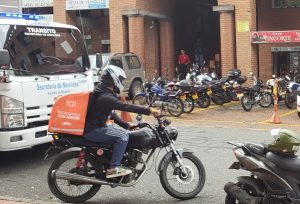
Rappi riders can be found in most major Colombian cities. Photo by Jordan Jones
On Friday, reports estimate that around one hundred Rappi riders–known locally as rappitenderos–met outside of the Rappi headquarters in Bogotá to protest against the lowering of their wages. The action was directed primarily at a company-wide decision to decrease the minimum wage a driver can make on any given delivery.
One of the principal grievances of Rappi riders is a change that took place in mid-August that lowers the minimum cost of a delivery from 3,500 pesos to 2,000 pesos. According to Rappi’s website, this cut in cost accounts for a shift in the driver’s earning model which takes into consideration the distance one has to travel from the restaurant to a particular client. However, a considerable bloc of Rappi drivers either are not aware of the changes or have not received their intended benefits.
Since the mobile application was founded in 2015, the fluorescent, salmon-colored delivery bags have become ubiquitous around Colombian cities. More often than not rappitenderos can be spotted carving through traffic to meet the company’s commitment to deliver orders in less than an hour.
In Medellín’s barrio of Poblado most rappitenderos make their delivery on motorbikes given the steepness of the terrain. Following the changes Rappi has made in calculating wages, rappitenderos can now be seen parked alongside the street or congregating near busy street corners, waiting for their phone to signal the next order. Many now wait until 10:30am before they can make their first order. Some claimed to have previously earned up to 100,000 pesos a day. After the changes however they now see 20-30,000 pesos a day.
One Rappi driver, Levensen, expressed a similar frustration to Friday’s protesters after making a ten kilometer delivery to Envigado only to find that he would not be compensated for the distance. “I was the one who lost out—gasoline, time, the wear-and-tear of my moto,” the Medellín-native told us.
Many of the drivers we spoke to in Bogotá and Medellín saw an enormous decrease in their earnings overnight, which strained those who had Rappi as their sole source of income.
In addition to their wages being reduced, riders also bear other initial costs and expenses. For example, Rappi sells the oversized orange delivery backpacks at $89,500 COP prior to riders joining as employees. Rappi sells other merchandise as well like hats ($7,000), windbreakers ($38,000), premium jackets ($63,500) and an assortment of mugs, pens, and knicknacks.
However, dressing like a rappitendero is nowhere near as costly as the accrued expense of the operation itself. Rappi riders are expected to cover the costs of gasoline, parking, general moto/bicycle maintenance, parking violations, and of course, time.

Rappitenderos can often be caught off guard by traffic wardens for double parking. Photo by Jordan Jones
There are also extreme cases–like when accidents occur on the road or the transit wardens swoop in to confiscate double-parked motorbikes–where riders are left vulnerable and unprotected as employees.
In response to the charges, a spokesperson for Rappi said iin a statement to W Radio that the changes were made to “reflect the efforts of the rappitenderos and are based on recommendations and suggestions they have made through communication channels.” Despite the sentiment, many of the drivers feel like Rappi is growing at their expense. This growth has been exponential this year. In early September, Rappi became the first startup in Colombia to receive a billion-dollar valuation.
When visiting Rappi HQ in Medellín, a courteous Rappi representative named Sara told The Bogotá Post that they couldn’t comment further at this stage about the changes in wages and that the statement from the head office in Bogotá would be the official line.
However, despite the growing frustration over lower wages, the job still appears an attractive option for countless numbers of Colombians–and newly-arrived migrants from Venezuela–who continue to line up to find work at Rappi in favour of more taxing jobs within Colombia’s informal economy.
One such rappitendero is Miguel Fiero Garcia, an apprentice at a workshop from Cali, who said that despite the difficulties Rappi gives him the freedom to learn a trade and earn money simultaneously.
“More than anything else it allows me to study and, the rest of the time, I work for Rappi.”
With reporting by Jordan Jones and Arjun Harindranath





